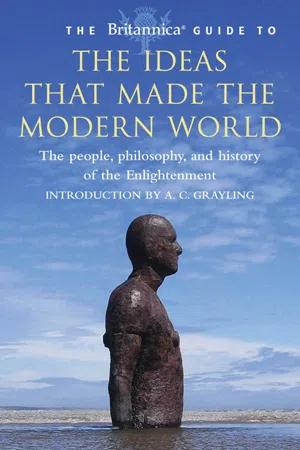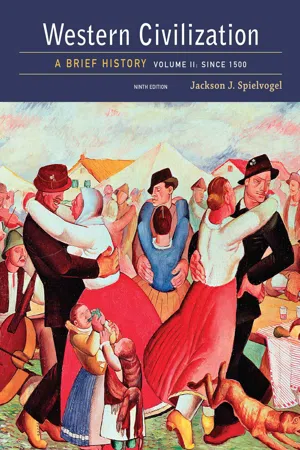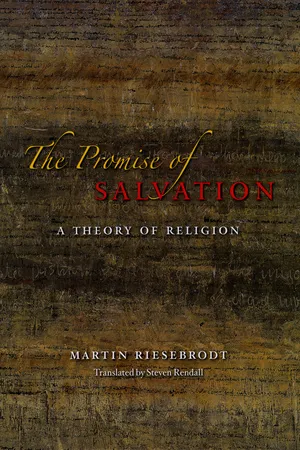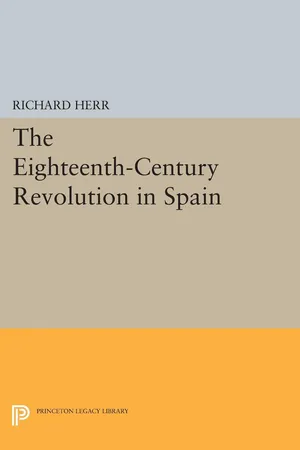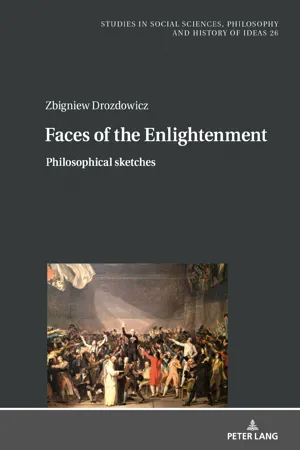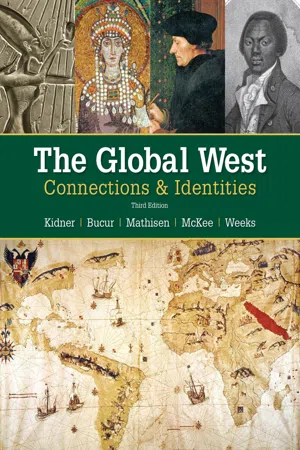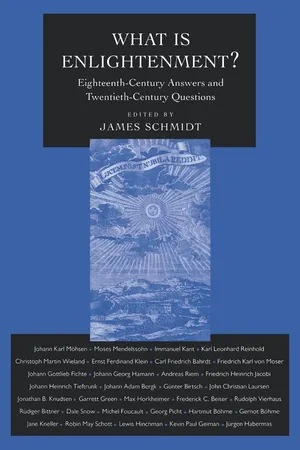History
Enlightenment & Religion
During the Enlightenment, there was a shift in attitudes towards religion, with an emphasis on reason, science, and individualism. This period saw the rise of religious tolerance and the questioning of traditional religious authority. Enlightenment thinkers sought to reconcile religious beliefs with rational thought, leading to the development of new religious and philosophical ideas that influenced the modern world.
Written by Perlego with AI-assistance
Related key terms
1 of 5
11 Key excerpts on "Enlightenment & Religion"
- eBook - PDF
- Encyclopaedia Britannica, Inc.(Authors)
- 2008(Publication Date)
- Encyclopaedia Britannica, Inc.(Publisher)
1 A HISTORY OF THE ENLIGHTENMENT The Enlightenment (in French the Sie Ácle des Lumie Áres ( ``Age of the Enlightened''), in German Aufkla È rung ) swept through Europe in the 17th and 18th centuries. With new ideas con-cerning God, reason, nature, and man, the Enlightenment offered a world view that gained wide assent and instigated revolutionary developments in art, philosophy, and politics. Central to Enlightenment thought were the use and the cele-bration of reason, the power by which man understands the universe and improves his own condition. The goals of ra-tional man were considered to be knowledge, freedom, and happiness. The Enlightenment was both a movement and a state of mind. The term represents a phase in the intellectual history of Europe, but it also serves to define the programmes of reform advocated by influential French writers, philosophers, and scientists, known as ``philosophes'', who were inspired by a common faith in the possibility of a better world. The special significance of the Enlightenment lies in its combination of principle and pragmatism. There are two traditional schools of thought regarding its character and achievements. The first sees the Enlightenment as the preserve of an elite centred on Paris and as primarily a French movement, while the second perceives it as an inter-national phenomenon with as many facets as there were countries affected. Although most modern interpreters incline to the latter view, there is still a case for the French emphasis, given the genius of a number of the philosophes and their associates. Unlike other terms applied by historians ``the Enlightenment'' was used and cherished by those who believed in the power of the mind to liberate and improve. - eBook - PDF
Western Civilization
A Brief History, Volume II: Since 1500
- Jackson Spielvogel(Author)
- 2016(Publication Date)
- Cengage Learning EMEA(Publisher)
For most of the philosophes, “enlightenment” included the rejection of traditional Christianity. The religious wars and intolerance of the sixteenth and seventeenth centuries had so alienated intellectuals that they were open and even eager to embrace the new ideas of the Scientific Revolution. Whereas the great scientists of the seventeenth century believed that their work exalted God, the intellectuals of the eighteenth century read those scientific conclusions a different way and increasingly turned their backs on Christian orthodoxy. Consequently, European intellectual life in the eighteenth century was marked by the emergence of the secularization that has characterized the modern Western mentality ever since. Ironically, at the same time that reason and materialism were beginning to replace faith and worship, a great outburst of religious sensibility manifested itself in music and art. Clearly, the growing secularization of the eighteenth century had not yet captured the hearts and minds of all European intellectuals and artists. The Enlightenment Q F OCUS Q UESTIONS : What intellectual developments led to the emergence of the Enlightenment? Who were the leading figures of the Enlightenment, and what were their main contributions? In what type of social environment did the philosophes thrive, and what role did women play in that environment? In 1784, the German philosopher Immanuel Kant ( i-MAHN-yoo-el KAHNT ) (1724–1804) defined the Enlightenment as “man’s leaving his self-caused immaturity.” Whereas earlier periods had been handi-capped by the inability to “use one’s intelligence with-out the guidance of another,” Kant proclaimed as the motto of the Enlightenment: “Dare to know! Have the courage to use your own intelligence!” The eighteenth-century Enlightenment was a movement of intellec-tuals who dared to know. - eBook - PDF
Western Civilization
A Brief History, Volume II since 1500
- Jackson Spielvogel(Author)
- 2019(Publication Date)
- Cengage Learning EMEA(Publisher)
Ironically, at the same time that reason and materialism were beginning to replace faith and worship, a great outburst of religious sensibility manifested itself in music and art. Clearly, the grow- ing secularization of the eighteenth century had not yet captured the hearts and minds of all European intellectuals and artists. 17-1 THE ENLIGHTENMENT Q Focus Questions: What intellectual developments led to the emergence of the Enlightenment? Who were the leading figures of the Enlightenment, and what were their main contributions? In what type of social environment did the philosophes thrive, and what role did women play in that environment? In 1784, the German philosopher Immanuel Kant (i-MAHN-yoo-el KAHNT) (1724–1804) defined the Enlightenment as “man’s leaving his self-caused immaturity.” Whereas earlier periods had been handi- capped by the inability to “use one’s intelligence with- out the guidance of another,” Kant proclaimed as the motto of the Enlightenment: “Dare to know! Have the courage to use your own intelligence!” The eighteenth- century Enlightenment was a movement of intellectuals who dared to know. They were greatly impressed with the accomplishments of the Scientific Revolution, and when they used the word reason—one of their favorite 390 ■ CHAPTER 17 The Eighteenth Century: An Age of Enlightenment had embarked on voyages of discovery to other parts of the world in the late fifteenth and sixteenth centuries. In the course of the seventeenth century, traders, mis- sionaries, medical practitioners, and explorers began to publish an increasing number of travel books that gave accounts of many different cultures. Then, too, the new geographic adventures of the eighteenth century, especially the discovery in the Pacific of Tahiti, New Zealand, and Australia by the British explorer James Cook, aroused much enthusiasm. Educated Europeans responded to these accounts of lands abroad in differ- ent ways. - eBook - PDF
The Causes of War
Volume IV: 1650 - 1800
- Alexander Gillespie(Author)
- 2021(Publication Date)
- Hart Publishing(Publisher)
However, in the final years of the eighteenth century, the revolution had begun to mellow and Catholicism was once more allowed to breathe again in France. Hence-forth it was to be only one faith among many, equal to all and stripped of political power. 2. E NLIGHTENMENT The period of this book, from 1650 to 1800, reflects a pathway in Europe in which religion increasingly began to lose its position as the foremost compass that most Enlightenment 329 1 Dominguez, J (2017). ‘Religious Toleration in the Age of Enlightenment’. History of European Ideas . 43(4): 273–87; See Young, B (2000). ‘Religious History and the Eighteenth-Century Historian’. The Historical Journal . 43(3): 849–68. 2 This wording is from the ‘Indictment Against Sarah Good for Afflicting Sarah Bibber’. It is reprinted in Godbeer, R (ed.) The Salem Witch Hunt: A Brief History with Documents . (Saint Martins, Boston, 2011). 74, 75. 3 Nash, D (2008). ‘Blasphemy and the Strange Persistence of Providence in Britain since the Seventeenth Century’. Journal of Religious History� 32(4): 439–56; Harris, C (2011). ‘Witchcraft: From Crime to Civil Liberty’. Law and Justice . 167: 54–75; Bever, E (2009). ‘Witchcraft Prosecutions and the Decline of Magic’. The Journal of Interdisciplinary History . 40(2): 263–93; Bailey, M (2006). ‘The Disenchantment of Magic’. The American Historical Review . 111(2): 383–404; Levack, B (ed.) The Witchcraft Sourcebook . (Routledge, London, 2004). 163–66, 171, 221. 4 Israel, J (2013). Democratic Enlightenment . (Oxford University Press, Oxford). 40–41, 50–55. countries possessed. There are many reasons for this massive social transformation in Europe and their colonies. Foremost amongst these was the power of the Enlightenment. To the minds of many, the Enlightenment was about the extension of tolerance on questions of reli-gion, reducing the power of all religious authorities, and destroying superstition and its twin, fanaticism. - H. James Birx(Author)
- 2010(Publication Date)
- SAGE Publications, Inc(Publisher)
I n the broadest sense of the word, enlightenment refers to the development and dissemination of the arts and sciences. Enlightenment entails secularism to a great extent in the Western intellectual tradition, though the two terms are not interchangeable. The entailment of secular ideas distinguishes the European Enlightenment from that of other traditions of the same name, namely the Buddhist Enlightenment of a much earlier period. However, enlightenment can also be described as tran-scendence, and in this regard, the Western Enlightenment is much less distant from its Buddhist counterpart. Indeed, transcendence is a key component of both enlightenment and secularism. This chapter describes the key compo-nents of enlightenment and secularism, and the relation-ship between the two concepts, as they have developed in the Western intellectual tradition, and as they continue to develop in our time. In 1784, the German philosopher Immanuel Kant (1724–1804) accepted the challenge of defining the elu-sive concept of enlightenment in an essay titled, “What Is Enlightenment?” Already a renowned figure of the 18th-century Age of Enlightenment, which will be discussed ahead, Kant responded to the question with the following opening, provocative for its age: Enlightenment is man’s emergence from his self imposed nonage. Nonage is the inability to use one’s understanding without another’s guidance. This nonage is self imposed if its cause lies not in lack of understanding but in indecision and lack of courage to use one’s mind without another’s guidance. Saper Aude! Dare to Know! Have the courage to use your own understanding is therefore the motto of the Enlightenment. (as cited in Durant & Durant, 1967, p. 540) Kant’s insistence on the importance of using one’s own mind without another’s guidance is a central theme of enlightenment. The implications are perhaps greatest for humankind’s relationship with religious establishment.- eBook - PDF
The Promise of Salvation
A Theory of Religion
- Martin Riesebrodt, Steven Rendall(Authors)
- 2010(Publication Date)
- University of Chicago Press(Publisher)
8 In contrast, more moderate representatives of the Enlightenment sought to reconcile reason and religion by rationalizing religion itself. They dreamed of a reasonable religion in the form of a natural religion, or a reasonable Christianity in which the emphasis was on ethics. 9 As a reaction to the Enlightenment discourse, the Romantics put religion beyond the reach of rational criticism by assigning it a special place in the heart or soul [ Gemüt ]. The Romantic approach thus created an enclave for religion within human nature that was analogous to that for aesthetics. On this view, religion was naturally inherent in humans as a potential that could be developed or allowed to wither away. At the same time, this view made religion sui generis, that is, irreducible to other phenomena and impossible to explain by means of social or psychological factors. Religion was character-ized as a form of intuition that could be the bearer of both individual “genius” and the “genius” of a “people.” The now widespread notion of “spirituality” continues the individualistic orientation of Romantic discourse. 10 The secularization discourse, which dominated the past century, contin-ued the Enlightenment discourse in a modified way. Now it was primarily a question of the alleged retreat of religion from state and society to the social periphery and the human private sphere. Historically, this view was always chapter one only partly correct, and given the massive increase in religious movements and the return of religions into the political public sphere, it rightly entered a crisis that favored the emergence of postmodern discourse. In the Enlightenment, Romantic, and secularization discourses, the goal was to determine the “essence” of religion and its role in modernity. - eBook - PDF
- Richard Herr(Author)
- 2015(Publication Date)
- Princeton University Press(Publisher)
PART I THE ENLIGHTENMENT CHAPTER I THE TIME OF ENLIGHTENMENT A FTER the culture of the Middle Ages passed its zenith, J \ there began a gradual development in the intellectual JL JL spirit of Europe that was to culminate in the eighteenth century. Religion, which was the medieval basis for men's think- ing on the problems of life, was slowly driven from its prominent position by knowledge of a more secular kind. At the same time, freedom to express unorthodox ideas advanced. The humanism of the Renaissance marked the first big step along the path. The Reformation brought the next, although its leaders had not intended to do anything but strengthen the religious spirit of Christianity. By the middle of the seventeenth century the Christian church had lost the supreme social authority which it had always asserted. The Reformation had destroyed its unity, and out of the ensuing chaos came the reality, soon justified by the theory, of religious toleration. At the same time in many lands the church fell under state control. Even the most powerful of the various churches that now were claiming to be the sole interpreters of the teachings of Jesus no longer had its former political influence. The Peace of Westphalia of 1648 was made against the wishes of the head of the Roman Catholic Church and accepted despite his condemnation. This flouting of the pope was symbolic of the determination—and ability—of Catholic princes in the future to be princes first and Catholics second. By this date a new spirit of independence from traditional religion and theology was invading all fields of thought. Because of the stricter control of thought in Catholic countries, Protestant lands were in general the first scene of the new development. In England, Francis Bacon opened the seventeenth century by dis- missing Aristotle, the authority on whom medieval Christian scientific and philosophic thought had rested, in favor of the direct observation of nature as the source of knowledge; and - eBook - PDF
Religion and Innovation
Antagonists or Partners?
- Donald A. Yerxa(Author)
- 2015(Publication Date)
- Bloomsbury Academic(Publisher)
Indeed, it is an interesting historical curiosity that prior to the seventeenth century, innovation had significantly negative connotations. Positive 86 Religion and Innovation change was spoken of as ‘reformation’ or ‘renovation’, both of which denote the recapturing of positive elements of a lost or forgotten past. The valence of innovation changes over the course of the seventeenth century. It follows that the teleological historical narratives that begin to be formulated from the eighteenth century onwards not only purport to tell a story that highlights modern innovation. They also embody a quite new attitude to novelty that accords a positive status to innovation and the factors conducive to it. 6 Religion, Scientific Naturalism and Historical Progress PETER HARRISON The idea of progress has long been associated with the European Enlightenment. Over the course of the eighteenth century, a number of prominent French philosophes enthusiastically announced the inauguration of a new era of human advancement in which the achievements of the moderns would far outstrip even the most impressive accomplishments of past civilizations. Religion and science were allotted specific roles in the standard version of this story: religion represented the stultifying forces of conservatism, while science was the embodiment of moral and material progress. The philosopher, mathematician and political theorist Nicolas de Condorcet thus declared in his Sketch for a Historical Picture of the Progress of the Human Spirit (1795) that ‘the triumph of Christianity was the signal for the complete decadence of philosophy and the sciences’. Escaping the bondage of religious ideas and institutions – and in particular those of Catholic Christianity – was a precondition for the progress of society, and Condorcet and his fellow philosophes applauded this process which they believed to be well in train. - eBook - PDF
Faces of the Enlightenment
Philosophical sketches
- Zbigniew Drozdowicz(Author)
- 2020(Publication Date)
- Peter Lang Group(Publisher)
One of those correctives is issued in the essay: “What is Enlightenment? (Was ist Aufklärung?)” 116 . In its light: “Enlightenment is man’s emergence from his self-imposed immaturity. Immaturity is the inability to use one understanding without guidance from another. Self-incurred is this tutelage when its cause lies not in lack of understanding (Verstand), but rather of resolve and courage to use it without direction from another. Sapere Aude! Have courage to use your abstract view of the Enlightenment or to ignore its anti-intellectual character, then it would become difficult to admit that the “rational systems” had long been dead and the “Copernican turn” was already under way when Kant entered the scene. In the German conditions, the situation was defined by the struggle between the school of Wolff and his detractors, which somehow forced Kant to belatedly discover anew certain truths that were already cliché for the West-European Enlightenment. Cf. P. Kondylis, Die Aufklärung im Rahmen des neuzeitlichen Rationalismus, op. cit., p. 673 et seq. According to the Polish expert on the philosophy of I. Kant – Marek Siemek – there are elements in Kant’s pre-critical writings which can also be found in the works of such philosophers of the Enlightenment period such as Leibniz or Ch. Wolff: “it is around 1770 that Kant finally realizes the fundamental difference between both major endeavors of this metaphysics, rational ontology and theodicy and his own ideas”. In his general evaluation he states that “although the intellectual horizon of Kant’s philosophy goes well beyond the boundaries of Enlightenment, his philosophy did actually result from the dynamics of the Enlightenment thinking in most of its crucial points.” Cf. M. Siemek, Racjonalizm i naturalizm w filozofii niemieckiego Oświecenia, in Filozofia niemieckiego Oświecenia, op. - eBook - PDF
- Frank Kidner, Maria Bucur, Ralph Mathisen, Sally McKee(Authors)
- 2018(Publication Date)
- Cengage Learning EMEA(Publisher)
❯❯❱ Compare this etching with the portrait of Voltaire in this chap-ter. What do you think Voltaire would make of the differences? Granger, NYC – All rights reserved Immanuel Kant Other parts of Europe were less receptive to the radicalism that swept over France after 1750. In Prussia, Immanuel Kant summed up the philosophes’ program in What Is Enlighten-ment? (1784): “Dare to know…. Have the courage to use your own under-standing is … the motto of enlightenment.” Kant, however, never advocated democracy or any real social or political reform. People were free to use their minds to seek the truth but, according to Kant, should submit to the current political, social, and economic orders in which they found themselves. novel Literary form of prose fiction that was popular in the eighteenth century and sometimes used to promote social criticism and programs for reform. Immanuel Kant (1724–1804) Leading German philosophe of the late Enlightenment. Copyright 2019 Cengage Learning. All Rights Reserved. May not be copied, scanned, or duplicated, in whole or in part. Due to electronic rights, some third party content may be suppressed from the eBook and/or eChapter(s). Editorial review has deemed that any suppressed content does not materially affect the overall learning experience. Cengage Learning reserves the right to remove additional content at any time if subsequent rights restrictions require it. 481 17-4 Society and the Enlightenment world and, often lost in the contents of the page in front of them, had a wider range of imaginative read-ing experiences than people had ever had before. Lending Libraries One of the clearest signs of Euro-peans’ expanding reading habits was the spread of lending libraries , which allowed anyone who joined to check books out to read where they wished and thus eliminated the cost of pur-chasing them. Changes in Writing and Publishing The nature of writing and publishing changed with new read-ing habits. - eBook - PDF
- James Schmidt(Author)
- 1996(Publication Date)
- University of California Press(Publisher)
For it to work in the way that it does-and this is obviously a very large claim-it must implicitly contain within itself the promise of a community bound together by mutual understanding and agreement. Were the dream of enlightenment only that of seeing the world without shadows, of bathing everything in the light of reason, then indeed there might be something pathological in that dream: for to want to see every- INTRODUCTION 31 thing is to aspire to the standpoint of God or to that of the guardian in the Panopticon's tower. Perhaps the most important thing the Enlightenment taught was that we are neither gods nor guardians who survey the world from outside but rather men and women who speak from within it and must summon the courage to argue about what is true and what is false and what is right and what is wrong. And perhaps a reconsideration of the Enlight-enment's own discussion of the question What is enlightenment? can en-lighten our own understanding of what is still at stake when we argue about enlightenment. NOTES 1. Leszek Kolakowski, The Idolatry of Politics, Atlantic Communi9J Qyarter?J 24 (Fall 1986): 219-230, advances the first of these arguments, insisting that the Enlightenment's skepticism about absolute values threatens our ability to make the distinction between good and evil altogether (223), that its belief that human beings are entirely society-made leaves us conceptually defenseless in the face of totalitarian doctrines, ideologies, and institutions (224), and that its erosion of historical consciousness leads to a progressive decline of awareness that our spiri-tual life includes the sediment of the historical past (227). For the argument that liberal societies can dispense with philosophical foundations, see Richard Rorty, Contingency, Irony, and Solidari9J (Cambridge, 1989), 52-54.
Index pages curate the most relevant extracts from our library of academic textbooks. They’ve been created using an in-house natural language model (NLM), each adding context and meaning to key research topics.
